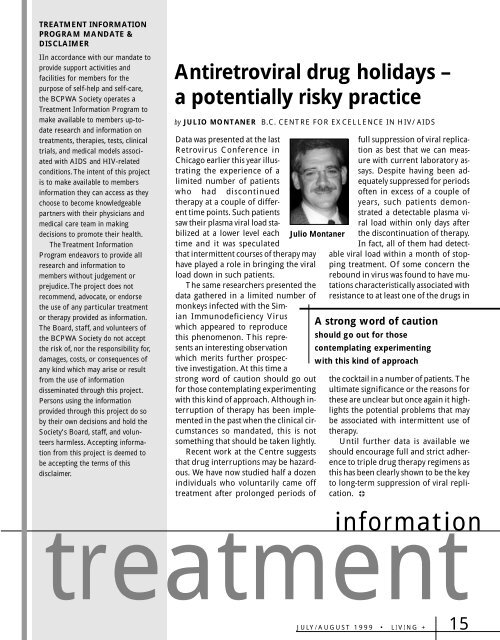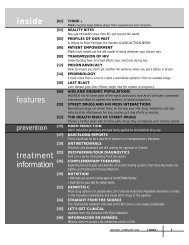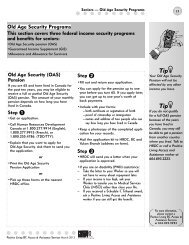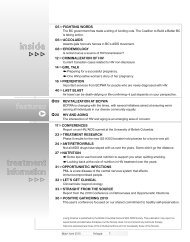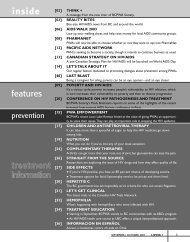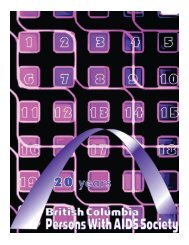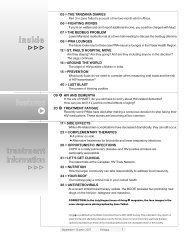Living + Magazine Issue 1 - Positive Living BC
Living + Magazine Issue 1 - Positive Living BC
Living + Magazine Issue 1 - Positive Living BC
You also want an ePaper? Increase the reach of your titles
YUMPU automatically turns print PDFs into web optimized ePapers that Google loves.
TREATMENT INFORMATION<br />
PROGRAM MANDATE &<br />
DISCLAIMER<br />
IIn accordance with our mandate to<br />
provide support activities and<br />
facilities for members for the<br />
purpose of self-help and self-care,<br />
the <strong>BC</strong>PWA Society operates a<br />
Treatment Information Program to<br />
make available to members up-todate<br />
research and information on<br />
treatments, therapies, tests, clinical<br />
trials, and medical models associated<br />
with AIDS and HIV-related<br />
conditions. The intent of this project<br />
is to make available to members<br />
information they can access as they<br />
choose to become knowledgeable<br />
partners with their physicians and<br />
medical care team in making<br />
decisions to promote their health.<br />
The Treatment Information<br />
Program endeavors to provide all<br />
research and information to<br />
members without judgement or<br />
prejudice. The project does not<br />
recommend, advocate, or endorse<br />
the use of any particular treatment<br />
or therapy provided as information.<br />
The Board, staff, and volunteers of<br />
the <strong>BC</strong>PWA Society do not accept<br />
the risk of, nor the responsibility for,<br />
damages, costs, or consequences of<br />
any kind which may arise or result<br />
from the use of information<br />
disseminated through this project.<br />
Persons using the information<br />
provided through this project do so<br />
by their own decisions and hold the<br />
Society’s Board, staff, and volunteers<br />
harmless. Accepting information<br />
from this project is deemed to<br />
be accepting the terms of this<br />
disclaimer.<br />
Antiretroviral drug holidays –<br />
a potentially risky practice<br />
by JULIO MONTANER B.C. CENTRE FOR EXCELLENCE IN HIV/AIDS<br />
Data was presented at the last<br />
Retrovirus Conference in<br />
Chicago earlier this year illustrating<br />
the experience of a<br />
limited number of patients<br />
who had discontinued<br />
therapy at a couple of different<br />
time points. Such patients<br />
saw their plasma viral load stabilized<br />
at a lower level each<br />
time and it was speculated<br />
that intermittent courses of therapy may<br />
have played a role in bringing the viral<br />
load down in such patients.<br />
The same researchers presented the<br />
data gathered in a limited number of<br />
monkeys infected with the Simian<br />
Immunodeficiency Virus<br />
which appeared to reproduce<br />
this phenomenon. This represents<br />
an interesting observation<br />
which merits further prospective<br />
investigation. At this time a<br />
strong word of caution should go out<br />
for those contemplating experimenting<br />
with this kind of approach. Although interruption<br />
of therapy has been implemented<br />
in the past when the clinical circumstances<br />
so mandated, this is not<br />
something that should be taken lightly.<br />
Recent work at the Centre suggests<br />
that drug interruptions may be hazardous.<br />
We have now studied half a dozen<br />
individuals who voluntarily came off<br />
treatment after prolonged periods of<br />
Julio Montaner<br />
full suppression of viral replication<br />
as best that we can measure<br />
with current laboratory assays.<br />
Despite having been adequately<br />
suppressed for periods<br />
often in excess of a couple of<br />
years, such patients demonstrated<br />
a detectable plasma viral<br />
load within only days after<br />
the discontinuation of therapy.<br />
In fact, all of them had detectable<br />
viral load within a month of stopping<br />
treatment. Of some concern the<br />
rebound in virus was found to have mutations<br />
characteristically associated with<br />
resistance to at least one of the drugs in<br />
A strong word of caution<br />
should go out for those<br />
contemplating experimenting<br />
with this kind of approach<br />
the cocktail in a number of patients. The<br />
ultimate significance or the reasons for<br />
these are unclear but once again it highlights<br />
the potential problems that may<br />
be associated with intermittent use of<br />
therapy.<br />
Until further data is available we<br />
should encourage full and strict adherence<br />
to triple drug therapy regimens as<br />
this has been clearly shown to be the key<br />
to long-term suppression of viral replication.<br />
information<br />
treatment<br />
JULY/AUGUST 1999 • LIVING + 15


